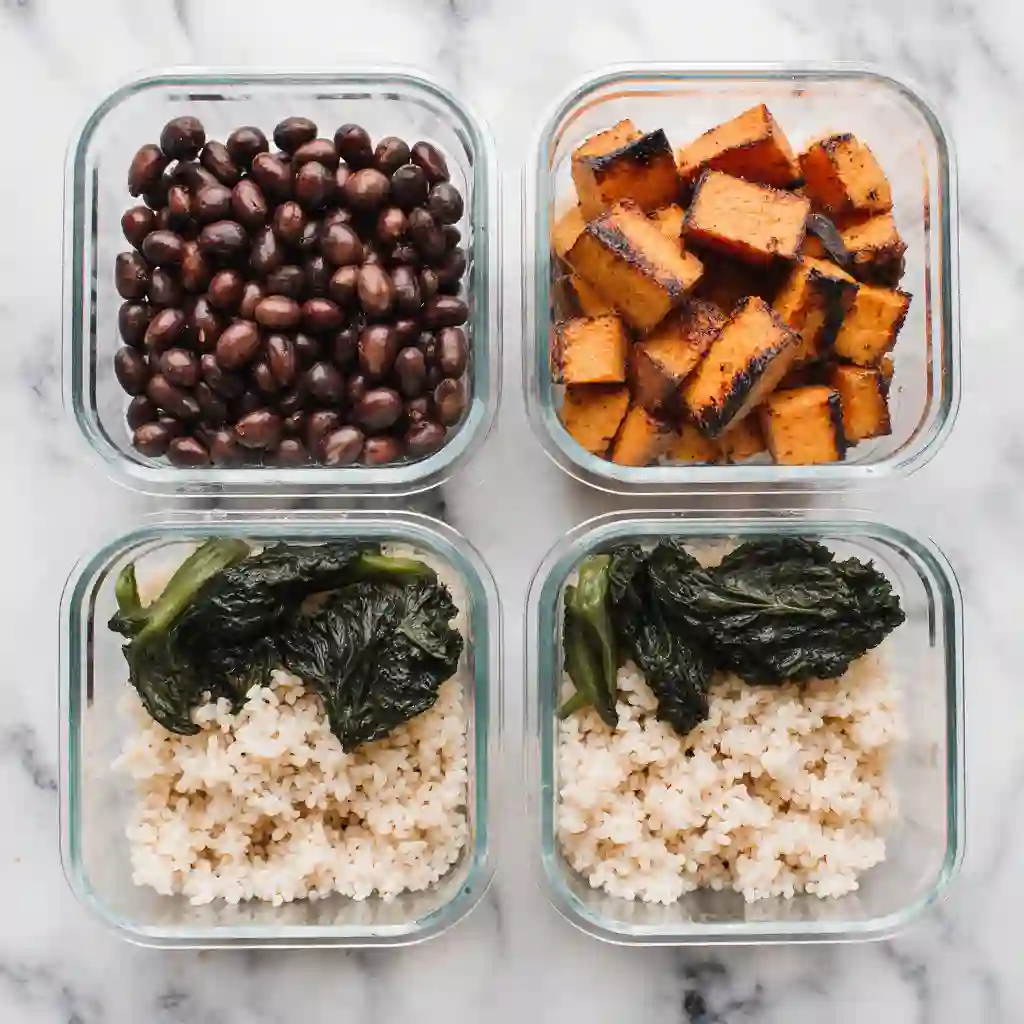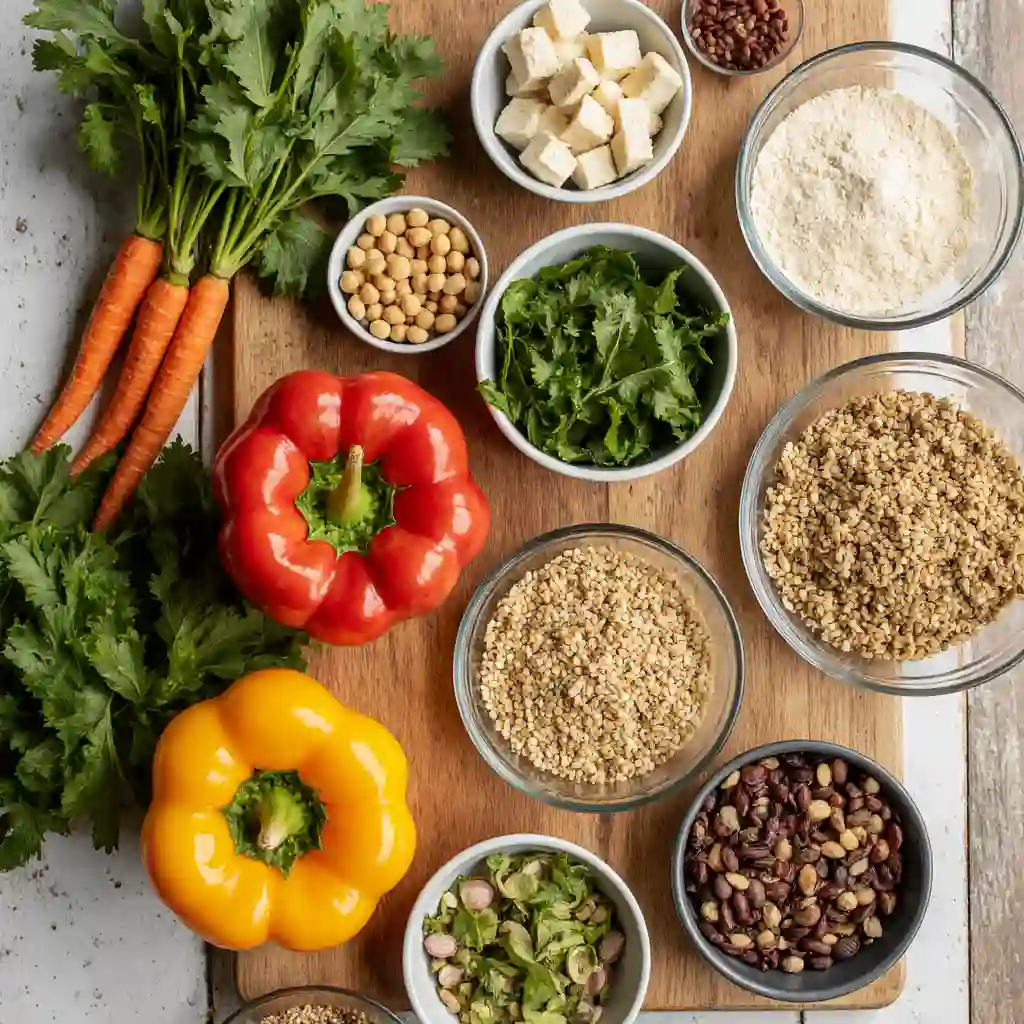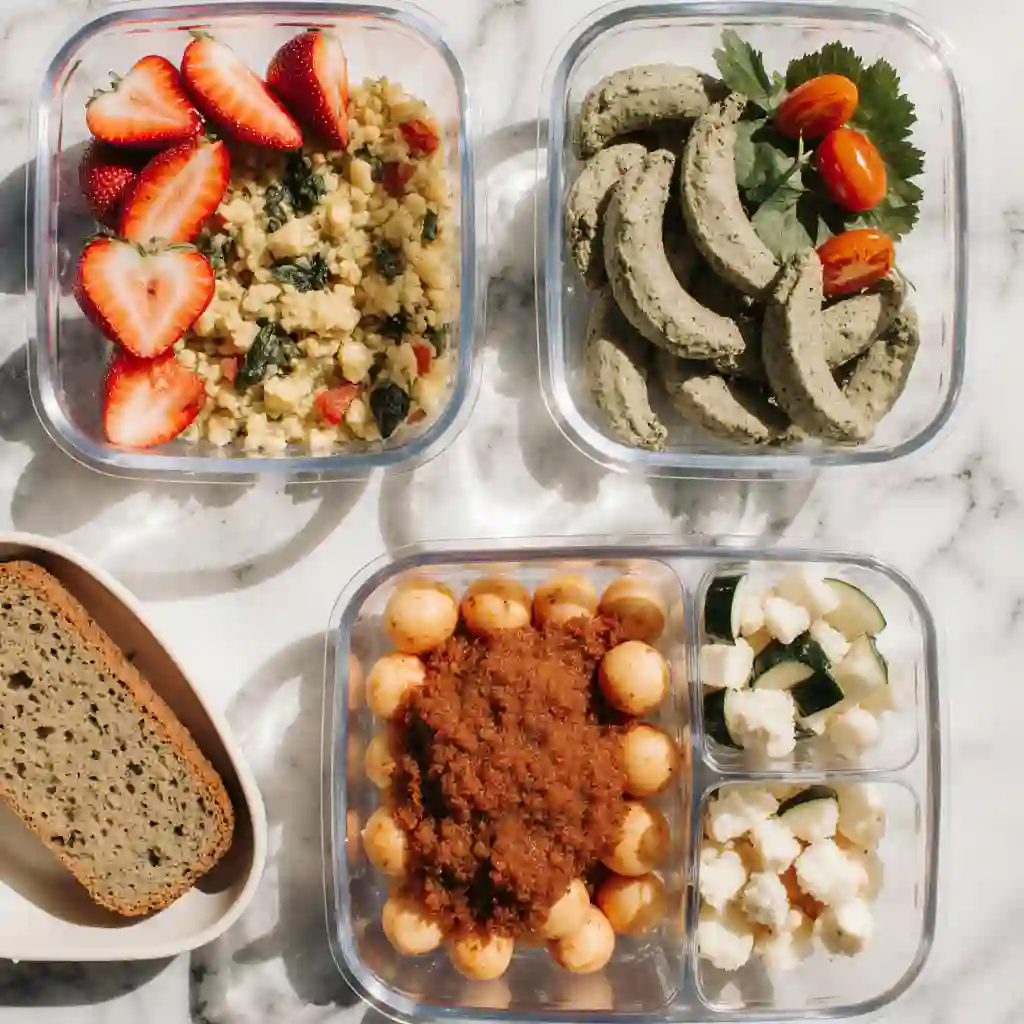Are you ready to take control of your health and simplify your life with plant-based meal prep recipes? As a chef who has worked in kitchens from New York to Tokyo, Chef Luna knows that meal prep is the secret to maintaining a healthy lifestyle without the stress. Imagine having your meals planned, prepped, and ready to go, leaving you more time to enjoy the things you love.
Plant-based eating has become a powerful choice for many, offering numerous health benefits and supporting environmental sustainability. However, for most, the challenge lies in consistently creating meals that are not only nutritious but also easy to make. That’s where the beauty of meal prepping comes in. By dedicating just a few hours each week, you can ensure that you’re fueling your body with vibrant, delicious, and wholesome meals that align with your vegan diet goals.
In my experience, from working in international kitchens, I’ve witnessed how transforming a few simple ingredients into well-planned meals can make life so much easier. Meal prepping is a game-changer, and I’m here to guide you through it. Let’s dive into these easy plant-based meal prep
recipes that will simplify your week and elevate your meals.

Plant-Based Meal Prep Recipes
Ingredients
Equipment
Method
- Cook quinoa according to package instructions, set aside.
- Roast diced sweet potatoes at 400°F (200°C) for 20 minutes, until tender.
- In a large bowl, combine cooked quinoa, roasted sweet potatoes, chickpeas, and spinach.
- Top with sliced avocado and serve in meal prep containers for easy, healthy meals.
Notes
What are the key health benefits of adopting a plant-based diet?
When it comes to choosing a plant-based diet, the benefits go far beyond just eating healthier. As Chef Luna has experienced in kitchens around the world, embracing a plant-based lifestyle not only supports your personal health but also contributes to the health of our planet. Let’s break down why plant-based eating is so beneficial.
Whole food plant-based diets are packed with nutrients, fiber, and antioxidants that are essential for optimal health. These diets are rich in fruits, vegetables, whole grains, legumes, and nuts foods that nourish the body and promote wellness. As a professional chef, I’ve worked with these ingredients extensively, and I can tell you first-hand that they not only taste amazing but are incredibly good for you. They help reduce the risk of chronic diseases such as heart disease, type 2 diabetes, and certain cancers.
Table of Contents
One of the most notable benefits of a plant-based diet is its high fiber content. Fiber is critical for improving digestion, and it keeps you feeling fuller for longer, which can aid in weight management. The wide variety of colorful fruits and vegetables on a plant-based plate is a visual feast, and it reflects the wide range of vitamins and minerals you’ll be providing your body with.
As Chef Luna, I’ve witnessed the remarkable impact plant-based eating can have on health. Whether it was during my time working in health-conscious kitchens in California or observing the clean eating trends in Europe, the results speak for themselves. People often report feeling more energized, having better digestion, and seeing improvements in their overall mood and well-being.
Incorporating more plant-based meals into your diet can make a significant difference in how you feel both physically and mentally. It’s not just about the food; it’s about the way plant-based eating can transform your lifestyle for the better.
Time-Saving Advantages of Meal Prepping
When life gets busy, the last thing you want is to spend hours in the kitchen each day trying to whip up a healthy meal. As Chef Luna, I know how valuable time is, especially when balancing a hectic schedule. That’s why meal prepping is such a game-changer, particularly for those who follow a plant-based diet.
Plant-based meal prep recipes are a fantastic way to save time while still enjoying nutritious and delicious meals. By dedicating just a few hours on the weekend to prep your meals for the week, you’ll find that it’s much easier to stick to your vegan diet goals. You can cook in bulk, chop vegetables, and prepare ingredients ahead of time, ensuring that your meals are ready to go when you need them.
During my years in the kitchen, I’ve learned that the most successful chefs aren’t the ones who work harder, but the ones who work smarter. The same principle applies to meal prepping. For example, cooking large batches of grains, beans, and vegetables at once allows you to mix and match them throughout the week. Imagine having your lunch or dinner already prepared and just needing to reheat it. No more scrambling to come up with a meal at the last minute or turning to unhealthy takeout options.
Meal prepping isn’t just about saving time it also helps reduce daily cooking stress. After a long day at work or school, it’s such a relief to know that a healthy meal is already waiting for you in the fridge. Plus, when your meals are prepped, there’s less temptation to reach for fast food or packaged snacks that don’t align with your health goals. This time-saving advantage makes it easier to stay on track and focus on other important parts of your day, whether it’s spending time with loved ones or enjoying some much-needed relaxation.
As someone who’s worked in kitchens globally, I can vouch for how much plant-based meal prepping can enhance your lifestyle. It’s not just about making life easier; it’s about making the commitment to healthier eating simpler and more sustainable.
Time-Saving Advantages of Meal Prepping
When life gets busy, the last thing you want is to spend hours in the kitchen each day trying to whip up a healthy meal. As Chef Luna, I know how valuable time is, especially when balancing a hectic schedule. That’s why meal prepping is such a game-changer, particularly for those who follow a plant-based diet.
Plant-based meal prep recipes are a fantastic way to save time while still enjoying nutritious and delicious meals. By dedicating just a few hours on the weekend to prep your meals for the week, you’ll find that it’s much easier to stick to your vegan diet goals. You can cook in bulk, chop vegetables, and prepare ingredients ahead of time, ensuring that your meals are ready to go when you need them.
During my years in the kitchen, I’ve learned that the most successful chefs aren’t the ones who work harder, but the ones who work smarter. The same principle applies to meal prepping. For example, cooking large batches of grains, beans, and vegetables at once allows you to mix and match them throughout the week. Imagine having your lunch or dinner already prepared and just needing to reheat it. No more scrambling to come up with a meal at the last minute or turning to unhealthy takeout options.
Meal prepping isn’t just about saving time it also helps reduce daily cooking stress. After a long day at work or school, it’s such a relief to know that a healthy meal is already waiting for you in the fridge. Plus, when your meals are prepped, there’s less temptation to reach for fast food or packaged snacks that don’t align with your health goals. This time-saving advantage makes it easier to stay on track and focus on other important parts of your day, whether it’s spending time with loved ones or enjoying some much-needed relaxation.
As someone who’s worked in kitchens globally, I can vouch for how much plant-based meal prepping can enhance your lifestyle. It’s not just about making life easier; it’s about making the commitment to healthier eating simpler and more sustainable.
Cost-Effectiveness of Plant-Based Meal Prepping
When you think of eating healthy, you might assume it comes with a hefty price tag. But as Chef Luna, who has worked in kitchens across the globe, I can tell you that plant-based eating can actually be quite affordable especially when you embrace meal prepping. The key to saving money while enjoying a plant-based diet lies in buying ingredients in bulk and preparing your meals at home.
One of the biggest benefits of plant-based meal prep recipes is how cost-effective they can be. Legumes, such as beans, lentils, and chickpeas, are not only packed with protein and fiber, but they’re also incredibly budget-friendly. In fact, they’re a fraction of the cost of animal proteins like chicken or beef. By cooking in bulk and portioning out your meals, you can stretch your grocery budget further while still eating healthy.
Whole grains like rice, quinoa, and oats are also very affordable and can be used in multiple meals throughout the week. These ingredients are not only cheap, but they also provide a solid nutritional base for your meals, offering plenty of essential vitamins and minerals. As a chef, I’ve spent years working with these ingredients, and I can tell you that their versatility is one of the reasons they are staples in plant-based meal prepping.
Buying in bulk can also help reduce food waste. Often, when we buy smaller amounts of fresh ingredients, we end up throwing out leftovers that go bad before we can use them. But when you prep your meals in advance, you can ensure that everything you buy gets used efficiently. Plus, when you buy larger quantities, it’s often cheaper per unit, which means more savings for you in the long run.
During my time in international kitchens, I saw firsthand how meal prepping in a professional setting could keep costs low while ensuring meals were both delicious and nutritious. Whether cooking for a large team or for individual clients, the principles of bulk cooking and strategic meal planning always resulted in healthier and more cost-effective dishes.
So, if you’ve been avoiding a plant-based diet because you think it’s too expensive, think again. With meal prepping, you can eat healthily, save money, and reduce food waste all while sticking to your vegan diet goals. The key is planning ahead and getting creative with affordable ingredients.
Environmental Impact of Plant-Based Meal Prepping
In addition to benefiting your health and saving you time and money, plant-based eating also has a profound positive impact on the environment. As Chef Luna, I’ve had the privilege of working in kitchens around the world, and I’ve seen how even small changes in what we eat can make a big difference for our planet. By embracing plant-based meal prep recipes, you’re not just nourishing your body you’re also contributing to a more sustainable future.
The environmental benefits of choosing a plant-based diet are immense. Livestock farming is one of the leading causes of greenhouse gas emissions, deforestation, and water consumption. By reducing your reliance on animal-based products and switching to plant-based ingredients, you can significantly reduce your personal carbon footprint. For example, producing plant-based foods typically requires fewer resources such as water and land compared to raising livestock.
As someone who has worked in kitchens across various countries, I’ve seen the shift toward more sustainable practices, especially in the plant-based food industry. Restaurants and home cooks alike are now more conscious of their environmental impact, choosing locally sourced vegetables, grains, and legumes over animal proteins. These choices not only reduce waste but also support local farmers and the local economy.
When you commit to meal prepping with plant-based ingredients, you’re helping to minimize food waste as well. By planning and preparing your meals in advance, you’re less likely to overbuy or throw away excess food. This is a simple yet effective way to reduce your environmental impact while still enjoying nutritious, flavorful meals.
Every time you choose a plant-based meal, you’re voting for a more sustainable and eco-friendly food system. From my experience in kitchens around the world, I’ve seen that small, intentional changes in our diets like focusing on plant-based meals can collectively make a huge difference in preserving our planet for future generations.
So, not only is meal prepping a tool for saving time, money, and stress it’s also a way to make choices that are kinder to the Earth. Each meal prepped with plant-based ingredients brings us one step closer to a more sustainable future, and that’s something we can all feel good about.
Essential Ingredients for Plant-Based Meal Prep

Starting your plant-based meal prep journey is easier than you might think, especially when you have the right ingredients stocked in your kitchen. As Chef Luna, who’s had the pleasure of working in kitchens worldwide, I can tell you that the foundation of any plant-based diet begins with a handful of key ingredients that are both versatile and nutrient-rich. These ingredients not only make cooking easier but also help you create delicious, satisfying meals all week long.
1- Whole Grains: The Foundation of Every Meal
Whole grains like brown rice, quinoa, barley, and oats are the building blocks of a great plant-based diet. These grains are not only affordable but also packed with essential nutrients like fiber, B vitamins, and iron. They can be cooked in bulk and used in multiple ways whether it’s as a base for salads, a side dish, or even in soups and stews.
As someone who has prepared hundreds of meals in international kitchens, I can tell you that whole grains are incredibly versatile. They’re filling, nutritious, and provide a satisfying texture to your meals. By cooking large quantities at once, you’ll save time and have a hearty base ready for use in various dishes.
2– Legumes: Your Protein Powerhouses
Legumes, such as beans, lentils, and chickpeas, are the cornerstone of any plant-based diet. They are rich in plant-based protein and fiber, making them perfect for meal prepping. Legumes are not only budget-friendly but also provide a wide range of nutrients, including iron and folate.
In my years of experience working with plant-based ingredients, legumes have been my go-to for creating filling, nutritious meals. Whether you’re making a stew, soup, salad, or veggie burger, legumes are a fantastic protein source that will keep you satisfied and nourished throughout the week.
3- Fresh Vegetables: Color and Nutrients in Every Bite
When it comes to plant-based meal prep, fresh vegetables are essential. They add color, texture, and a wealth of vitamins, minerals, and antioxidants to your meals. Leafy greens, bell peppers, carrots, and broccoli should always be in your kitchen to ensure you’re getting the full spectrum of nutrients your body needs.
In my kitchen experience, vegetables are often the star of the show. Whether you’re roasting them, steaming them, or using them raw in salads, fresh vegetables provide essential nutrients and make every meal visually appealing. A rainbow of vegetables is not just for looks it’s also a way to ensure you’re getting the maximum health benefits from your meals.
4- Nuts and Seeds: Healthy Fats and Protein Boosters
Nuts and seeds like almonds, chia seeds, and flaxseeds offer healthy fats, protein, and fiber, making them the perfect addition to your meal prep. They are a great source of omega-3 fatty acids, which are essential for brain health, and they also provide a satisfying crunch to dishes.
In my work across different kitchens, I’ve found that nuts and seeds can really elevate your meals. They can be sprinkled on top of salads, blended into smoothies, or used to create delicious plant-based sauces. Don’t underestimate the power of these little ingredients they’re packed with nutrients and flavor.
5- Plant-Based Proteins: Tofu, Tempeh, and Seitan
To add variety to your plant-based meals, include tofu, tempeh, and seitan in your meal prep. These plant-based proteins are incredibly versatile and can absorb any flavor you add to them. Tofu can be scrambled, grilled, or baked, while tempeh and seitan have a meaty texture that’s perfect for stir-fries, sandwiches, or even on their own as the main protein in a dish.
Throughout my career, I’ve worked with many different plant-based proteins, and these three are consistently my go-to options because they’re not only rich in protein but also adaptable to a variety of cooking methods and flavors. Whether you’re preparing a vegan stir-fry or marinating tofu for a bold flavor, these proteins offer endless possibilities.
6- Herbs and Spices: Flavor Boosters Without the Calories
No plant-based meal is complete without the perfect blend of herbs and spices. Basil, cumin, turmeric, and garlic are just a few examples of the flavor-enhancing ingredients that can turn any simple meal into something extraordinary. Not only do these herbs and spices boost the flavor of your dishes, but they also have numerous health benefits, such as anti-inflammatory properties and improved digestion.
In every kitchen I’ve worked in, I’ve always had an arsenal of herbs and spices on hand. They are essential for creating depth of flavor in plant-based meals without adding extra calories or unhealthy fats. A dash of turmeric in a curry or a sprinkle of cumin on roasted vegetables can make a world of difference in how your meals taste.
By stocking your kitchen with these essential ingredients, you’ll be well on your way to creating delicious, nutrient-dense meals that align with your plant-based diet goals. These ingredients provide the building blocks for endless meal prep possibilities, ensuring that you always have a healthy, satisfying meal at your fingertips. As Chef Luna, I can promise you that with the right ingredients, plant-based meal prepping is not only easy but also incredibly rewarding.
Simple Plant-Based Meal Prep Recipes
Now that you’ve got your essential ingredients ready, it’s time to dive into some easy plant-based meal prep recipes. These dishes are perfect for anyone looking to simplify their meal planning and enjoy healthy, delicious meals throughout the week. As Chef Luna, I’ve tested these recipes in various kitchens, and I can confidently say that they are both satisfying and nutrient-packed. Let’s get started.
1- Chickpea Salad Bowls
Ingredients:
- 2 cans of chickpeas, drained and rinsed
- 1 cucumber, diced
- 1 red bell pepper, diced
- 1 cup cherry tomatoes, halved
- 1/4 cup red onion, finely chopped
- 1/4 cup fresh parsley, chopped
- Juice of 1 lemon
- 2 tablespoons olive oil
- Salt and pepper to taste
Instructions:
- In a large bowl, combine chickpeas, cucumber, bell pepper, cherry tomatoes, red onion, and parsley. This colorful mix is not only visually appealing but also packed with essential vitamins and fiber.
- In a small bowl, whisk together the lemon juice, olive oil, salt, and pepper to make the dressing. It’s simple yet delicious, complementing the fresh ingredients perfectly.
- Pour the dressing over the chickpea mixture and toss to combine. Ensure all ingredients are well-coated, allowing the flavors to meld together.
- Divide into meal prep containers and store in the fridge for up to four days. This salad is perfect for quick lunches or as a light dinner option.
This Chickpea Salad Bowl is not only a vibrant, nutrient-packed meal, but it’s also a perfect example of how meal prepping can be quick and easy. The chickpeas provide plant-based protein, while the veggies bring a variety of textures and flavors to the dish.
2- Quinoa and Black Bean Stuffed Peppers
Ingredients:
- 4 bell peppers, halved and seeds removed
- 1 cup quinoa, cooked
- 1 can black beans, drained and rinsed
- 1 cup corn kernels (fresh or frozen)
- 1 cup salsa
- 1 teaspoon cumin
- 1/2 teaspoon chili powder
- Salt and pepper to taste
Instructions:
- Preheat your oven to 375°F (190°C). This step ensures that the peppers cook evenly and become tender.
- In a large bowl, mix quinoa, black beans, corn, salsa, cumin, chili powder, salt, and pepper. The combination of quinoa and beans provides a hearty, nutrient-rich filling for the peppers.
- Stuff each bell pepper half with the quinoa mixture. Make sure the mixture is packed tightly so the filling stays in place.
- Place the stuffed peppers in a baking dish and cover them with foil. The foil will help retain moisture, ensuring the peppers cook evenly and become tender.
- Bake for 30-35 minutes or until the peppers are soft. Allow them to cool slightly before serving or storing.
- Let cool and store in the fridge for up to five days. These stuffed peppers are perfect for meal prep and can be enjoyed warm or cold.
Quinoa and Black Bean Stuffed Peppers are an excellent source of plant-based protein, and the quinoa provides a filling base that pairs beautifully with the rich flavor of black beans and the sweetness of corn.
Overnight Oats
Ingredients:
- 1 cup rolled oats
- 1 cup almond milk (or any plant-based milk)
- 2 tablespoons chia seeds
- 1 tablespoon maple syrup
- Fresh berries for topping
Instructions:
- In a jar or container, combine oats, almond milk, chia seeds, and maple syrup. This base can be customized with different add-ins for variety, but this simple combination will give you a creamy, satisfying breakfast.
- Stir well, cover, and refrigerate overnight. Let the oats soak in the almond milk, absorbing all the nutrients and flavor.
- In the morning, top with fresh berries and enjoy! The berries add a burst of flavor and additional nutrients, making this a perfect, nutrient-rich meal to start your day.
Overnight oats are the ultimate plant-based meal prep recipe for breakfast. The oats provide fiber and carbohydrates, while chia seeds contribute healthy fats and protein. Plus, with just a few minutes of prep the night before, you’ve got a quick and healthy breakfast ready to go in the morning.
These easy plant-based meal prep recipes are designed to be quick, healthy, and packed with flavor. Whether you’re looking for a fresh salad, a hearty stuffed pepper, or a no-hassle breakfast, these recipes will make meal prepping simple and enjoyable. As Chef Luna, I know that when you take a little time to prep your meals, it can make all the difference in staying on track with your vegan diet and achieving your health goals.
Tips for Successful Plant-Based Meal Prep

Now that you have some easy plant-based meal prep recipes in your arsenal, let’s talk about a few essential tips to make your meal prepping even easier, more efficient, and even more delicious. These tips will help you stay organized, save time, and ensure that every meal is packed with nutrition.
1. Plan Ahead
The key to successful meal prepping is planning. Spend a few minutes each week mapping out your meals and creating a shopping list. This helps you avoid impulse buys and ensures you have everything you need to stay on track with your plant-based diet.
When I was working in kitchens around the world, planning ahead was a non-negotiable. It’s the same when it comes to plant-based meal prep having a game plan in place makes cooking much more manageable and less stressful. Consider your schedule for the week and make adjustments. For busier days, opt for simple plant-based recipes that require less prep time, or prepare extra servings of meals that can be easily reheated.
2. Batch Cooking
One of the best time-saving strategies for plant-based meal prep is batch cooking. Cook large quantities of grains, legumes, and vegetables at once. This ensures you always have a nutritious base ready to go, making it easier to throw together meals when you’re in a hurry. For example, cooking a big pot of quinoa or rice and a batch of roasted veggies at the beginning of the week will allow you to quickly assemble meals without having to cook from scratch every day.
From my experience in international kitchens, batch cooking is a game-changer. Not only does it save time, but it also allows you to incorporate more variety into your meals without adding extra prep time. You can mix and match your prepped ingredients for different meal combinations, keeping things exciting.
3. Use Airtight Containers
Proper storage is crucial to keeping your prepped meals fresh and free from contamination. Invest in high-quality, airtight containers to store your meals. This will help preserve the taste and nutrients of your meals, and prevent them from drying out or becoming soggy.
When I worked in high-volume kitchens, we always used the best storage solutions to keep ingredients fresh and maintain quality. The same goes for plant-based meal prepping using the right containers can extend the shelf life of your prepped meals and keep everything tasting as fresh as the day you made it.
4. Label and Date Your Meals
Label your meal prep containers with the contents and the date they were prepared. This ensures you’ll know exactly when to eat each meal and helps you avoid eating something that’s past its prime. It’s also helpful to keep track of how long each meal will last in the fridge, ensuring that nothing goes to waste.
In my experience, keeping things organized in the kitchen makes everything more efficient. Whether you’re working in a professional setting or at home, labeling meals allows you to stay on top of your meal prep, making it easier to grab a quick, healthy option when you need it.
5. Add Variety to Avoid Meal Fatigue
One of the biggest challenges with meal prepping is getting bored of eating the same thing day after day. To prevent meal fatigue, switch up your recipes weekly, or rotate different ingredients. Try experimenting with new spices, different cooking methods, or incorporating various cuisines to keep things interesting. For example, one week you might focus on Mediterranean-inspired dishes, while the next week, you could explore Asian or Mexican plant-based flavors.
Chef Luna here! From my time in kitchens across the globe, I can tell you that variety is key to keeping your plant-based meals exciting. By mixing up your flavor profiles, textures, and cooking styles, you’ll look forward to your meals all week long.
6. Flavor Boosters: Sauces and Dressings
Having a collection of sauces and dressings on hand is a great way to add flavor and variety to your meals. Homemade dressings, dips, and sauces can transform a simple dish into something extraordinary. For example, a tangy tahini dressing, a spicy peanut sauce, or a fresh pesto can completely change the flavor profile of a salad or grain bowl.
When I worked as a chef in high-end kitchens, sauces were always an essential part of creating memorable meals. The same applies to plant-based meals adding the right sauce or dressing can elevate your dish and make it feel gourmet without adding extra effort.
7. Don’t Forget Snacks
When planning your meals, don’t forget to include healthy snacks! Nuts, seeds, energy balls, or hummus with veggies are great, nutrient-dense options that keep you energized between meals. Plant-based snacks can be prepped in advance, just like your main meals, ensuring you always have something healthy on hand when hunger strikes.
8. Make It Fun.
Meal prepping doesn’t have to be a chore! Put on your favorite music or a podcast, and enjoy the process of cooking. When you approach plant-based meal prepping with a positive mindset, it becomes less of a task and more of a creative activity. Plus, you get to enjoy the satisfaction of knowing that your meals for the week are all set and ready to go.
Conclusion- plant-based meal prep recipes

Congratulations, you’re now armed with the knowledge and tools to successfully start your plant-based meal prep journey. As Chef Luna, who has spent years crafting meals in kitchens across the globe, I can tell you that incorporating meal prepping into your routine is one of the best decisions you can make for your health, your wallet, and the planet.
By dedicating a few hours each week to meal prepping with plant-based ingredients, you’re not just making life easier you’re also making it healthier and more sustainable. The health benefits of a plant-based diet are clear: from improved digestion to heart health, a plant-based diet can significantly improve your overall well-being. Plus, when you meal prep, you save time and reduce stress, ensuring you can enjoy your busy days without worrying about what to eat.
Remember, meal prepping doesn’t have to be overwhelming. Start with simple recipes like Chickpea Salad Bowls, Quinoa and Black Bean Stuffed Peppers, or Overnight Oats, and soon you’ll find yourself mastering the art of plant-based meal prep. Over time, you can experiment with new flavors, ingredients, and cuisines to keep things exciting and prevent meal fatigue.
I encourage you to take the first step today. Start small, get creative, and soon you’ll see how plant-based meal prepping can transform your eating habits, making healthy meals an easy, stress-free part of your life. As a chef who’s worked in kitchens around the world, I can tell you that with the right mindset and a little planning, the possibilities are endless.
Don’t forget your plant-based journey is just that: a journey. Celebrate every meal you prep, and enjoy the process of discovering new, nutritious, and delicious ways to fuel your body. You’ve got this.
FAQs
1. What are some good plant-based meals?
Some great plant-based meals include dishes that are rich in vegetables, legumes, grains, and healthy fats. Popular options are:
Chickpea Salad Bowls with fresh veggies and a tangy dressing.
Quinoa and Black Bean Stuffed Peppers, a hearty and satisfying meal.
Vegan Buddha Bowls, filled with grains, roasted veggies, legumes, and a delicious tahini dressing.
Lentil Stew, packed with vegetables and plant-based protein.
These meals are not only nutritious but also customizable to fit your flavor preferences.
2. Are plant-based meals good for weight loss?
Yes, plant-based meals can be excellent for weight loss! Since they are typically high in fiber and nutrients and low in calories, they can help keep you fuller for longer. Eating whole foods like fruits, vegetables, legumes, and grains can reduce overall calorie intake while providing the nutrients your body needs. Additionally, many plant-based meals are low in unhealthy fats, making them a great choice for sustainable weight management.
3. What is the best veggie for meal prep?
There isn’t one “best” veggie for meal prep, but some top choices include:
Broccoli: It keeps well after cooking and can be roasted, steamed, or added to stir-fries.
Sweet Potatoes: Nutritious, filling, and perfect for roasting in bulk.
Bell Peppers: Colorful, full of vitamins, and versatile in salads, stir-fries, or bowls.
Carrots: Great for roasting, snacking, or adding crunch to salads.
Spinach or Kale: These leafy greens can be added to salads, smoothies, or cooked dishes and store well.
These vegetables hold up well when cooked in advance, making them perfect for plant-based meal prep.
4. What do I eat in a day on a plant-based diet?
A day on a plant-based diet can look something like this:
Breakfast: Overnight oats with almond milk, chia seeds, and fresh berries.
Lunch: A chickpea salad bowl or a grain bowl with quinoa, roasted veggies, and a tahini dressing.
Snack: A handful of almonds, fruit, or hummus with carrot sticks.
Dinner: A hearty lentil stew or tofu stir-fry with brown rice and steamed vegetables.
Dessert (optional): A small serving of fruit or a healthy chia pudding.
The key to a successful plant-based diet is variety and balance, ensuring you get plenty of protein, healthy fats, and essential vitamins throughout the day.
5. What are some plant-based meal prep ideas for weight loss?
For weight loss, focus on low-calorie, high-fiber plant-based meals that keep you full while helping you manage your caloric intake. Here are a few ideas:
Chickpea Salad Bowls: Packed with fiber and protein, keeping you satisfied for longer.
Quinoa and Roasted Veggie Bowls: A filling meal full of fiber and healthy fats.
Zucchini Noodles with Marinara: A low-calorie alternative to pasta, topped with a rich tomato sauce.
Cauliflower Rice Stir-fry: Swap regular rice for cauliflower rice to reduce calories while still enjoying a tasty stir-fry.
These meals are nutrient-dense, low in calories, and great for plant-based weight loss.
6. What are some easy, healthy meal prep ideas for a plant-based or vegan diet?
Here are a few simple plant-based meal prep ideas to help you get started:
Quinoa and Black Bean Stuffed Peppers: Perfect for batch cooking and storing in the fridge for multiple meals.
Lentil and Vegetable Soup: Full of fiber and nutrients, and it keeps well for several days.
Vegan Wraps: Fill whole grain tortillas with hummus, roasted veggies, and avocado for a quick and nutritious meal.
Overnight Oats: A grab-and-go breakfast that can be prepped in minutes and customized with your favorite toppings.
Roasted Vegetables with Chickpeas: Simple to prepare and versatile just mix your favorite veggies and roasted chickpeas with some seasoning, and you’re good to go.
These easy recipes can be prepped in bulk and stored in the fridge, ensuring that you always have healthy, satisfying meals ready to enjoy.
Call to Action:
Ready to give these plant-based meal prep recipes a try? Share your meal prep creations with my web site www.fajitasrecipe.com, for a chance to be featured. Let’s inspire each other on this healthy, sustainable journey.
While plant-based meal prepping offers many health and environmental benefits, it’s important to remember that every individual’s dietary needs are different. As Chef Luna, I encourage you to listen to your body and make choices that are right for your unique lifestyle and health goals.
Before making significant changes to your diet, especially if you have underlying health conditions or specific nutritional needs, it’s always a good idea to consult with a healthcare professional, dietitian, or nutritionist. They can help you tailor your plant-based diet to meet your specific requirements and ensure you’re getting all the nutrients your body needs to thrive.
The recipes and tips provided here are based on my personal experience as a professional chef and my love for plant-based eating. However, everyone’s tastes, preferences, and needs are different. Feel free to modify the ingredients and techniques to suit your personal preferences or dietary restrictions.
Lastly, while plant-based meal prepping can save you time, money, and support your health, it’s important to maintain balance and variety in your meals to ensure you’re getting the full range of nutrients your body requires.Enjoy the journey of plant-based meal prepping, and always remember to keep it fun, flexible, and nourishing.




